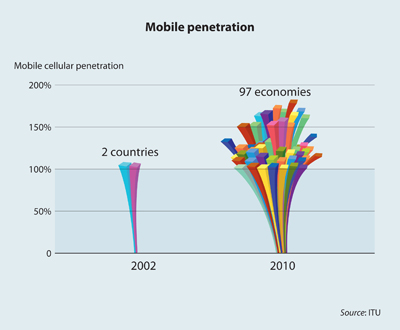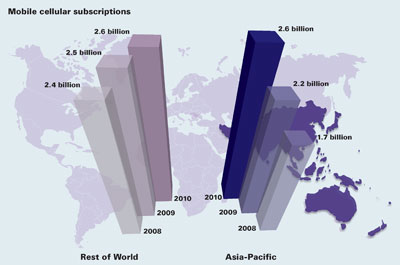The International Telecommunications Union met for ITU Telecom World 2011 last week and unveiled its latest Facts and figures on global internet use, particularly in developing countries.
 One third of the world’s population are forecast to be online by the end of 2011, 45% of whom will be under 25 with developing countries now accounting for some 62% of total global internet users up from 44% in 2006.
One third of the world’s population are forecast to be online by the end of 2011, 45% of whom will be under 25 with developing countries now accounting for some 62% of total global internet users up from 44% in 2006.- Mobile penetration set to continue its robust growth, with almost 6bn connected via mobiles and a global penetration that stands at an 87%, 79% for developing countries. A total of 159 economies worldwide have launched 3G services commercially and the number of active mobile-broadband subscriptions has increased to almost 1.2 billion. 3G population coverage has reached 45%, compared to 90 % of the population that is covered by a 2G mobile cellular network.
- Global disparities still remain. For example, while international Internet bandwidth has grown from 11’000 Gbit/s in 2006, to close to 80’000 Gbit/s in 2011, Europeans enjoy on average almost 90’000 bit/s of bandwidth per user compared to Internet users in Africans who are limited to 2’000 bit/s per user.
- The world’s top broadband economies are from Europe and Asia and the Pacific. In the Republic of Korea mobile-broadband penetration today exceeds 90% and almost all fixed-broadband connections provide speeds equal to, or above 10 Mbit/s. In comparison, broadband users in Ghana, Mongolia, Oman and Venezuela are limited to broadband speeds below 2 Mbit/s.
Amazon, Apple, Facebook, and Google don’t recognize any borders. They’re now venturing into retailing, advertising, publishing, movies, TV, communications, and even finance.
Over the next two years, Amazon, Apple, Facebook, and Google will increasingly collide in the markets for mobile phones and tablets, mobile apps, social networking, says Fast Company. They’re on the verge of war.





No comments:
Post a Comment
Thank's!